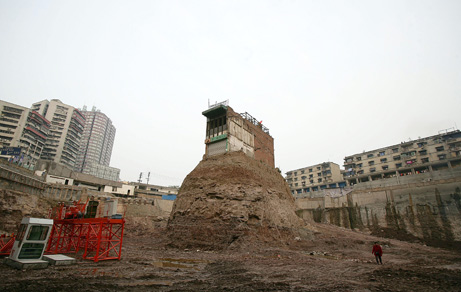The most important signal in this story is the likelihood that Senator Robert Nichols’ CDA moratorium bill (SB 1267) WILL be voted OUT of committee today! That said, Governor Perry continues to spew inaccurate spin about the overall affect of the CDA moratorium bill. It only halts private toll equity projects (Comprehensive Development Agreements or CDAs) as Senator Robert Nichols, the bill’s author, has repeatedly emphasized, nor are Perry’s “cronyistic” private toll road deals and secret back room deals selling off Texas to the highest bidder the ONLY way to finance new roads. Just read this A&M Study from HIS OWN COMMISSION that says otherwise. Perry knows he’s in trouble when he has to call in the Secretary of Transportation, Mary Peters, to hold his hand…
Link to article here.
Perry rips bill to hold off on toll roads
By Clay Robison
Express-News
04/03/2007
Austin Bureau AUSTIN — With U.S. Transportation Secretary Mary Peters offering her support, Gov. Rick Perry on Tuesday lashed out against legislation that would impose a two-year moratorium on toll-road privatization.Perry said the proposal, co-sponsored by strong majorities in the House and Senate and reflecting the public controversy over the Trans Texas Corridor, would cost the state critical business expansion opportunities.
“Our message today is that building needed infrastructure is essential to creating jobs and attracting economic development investments in Texas. And you can’t accomplish that with a two-year moratorium on needed road projects,” Perry said.
Although the moratorium legislation is co-sponsored by 27 of 31 senators and 111 of 150 House members, it faces an uncertain future because of strong pressure to continue building highways and waning mileage from the state gasoline tax, the traditional revenue source for highway construction.
Lt. Gov. David Dewhurst said the Senate Transportation and Homeland Security Committee is likely to approve the bill today but that further action would be delayed as lawmakers continued seeking a compromise.
In a related development, the Senate approved a bill Tuesday by Finance Chairman Steve Ogden, R-Bryan, that would double to $6 billion the cap on bonds that may be used to fund highways.
Ogden said the bill would eliminate the need for highway officials to seek “exotic funding” in the form of privately owned toll roads.
But Perry said there will be no new roads in Texas without his public-private financing scheme. And Peters said other states need to adopt Perry’s approach to road building.
The governor chose a visit to a Samsung semiconductor plant in Austin to make his highway pitch. The plant is near the route of the first Trans Texas Corridor project, a proposed series of toll roads running parallel to Interstate 35.
It has sparked considerable controversy, mainly over the state’s decision to contract with a private consortium headed by a Spanish company, Cintra, to develop a long-range plan for the corridor.
The state would share in profits from the toll roads. But a recent report by the state auditor’s office was sharply critical of the corridor project, concluding that taxpayers might never know how much they could end up paying for it.


